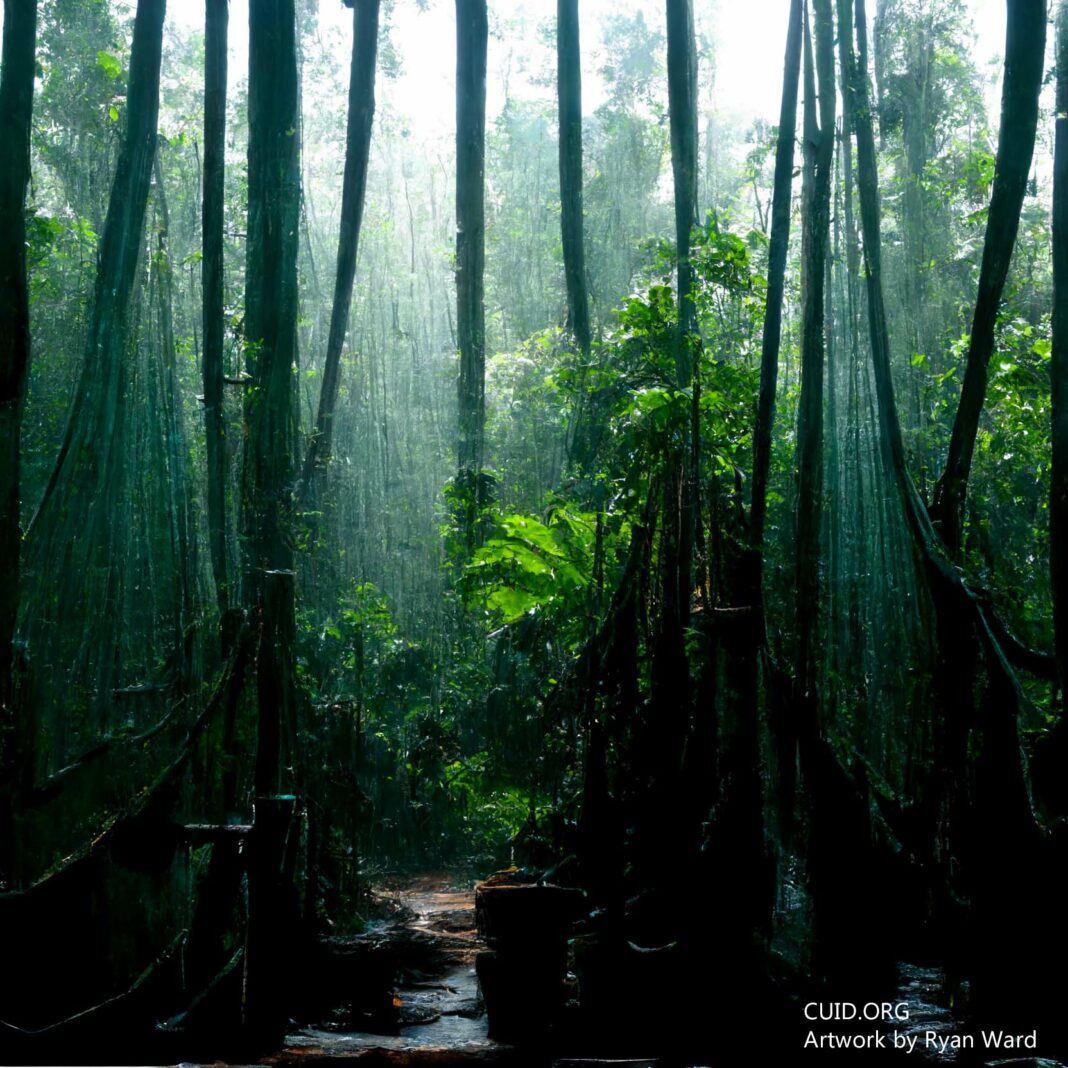Published by: Rosie Wright, and artwork by Ryan Ward.
It’s the first night of my honeymoon and I’m showering from a bucket of rainwater under the star-pricked darkness of the rainforest canopy. We’ve eschewed the traditional luxury resorts hotels and are instead staying at the Madidi Jungle Eco Lodge, a resort in the Bolivian Amazon which aims to minimise the environmental impact of its guests, in part through its water, electricity and waste management.
We’re not alone in looking for alternative ways to travel. A 2018 study by the World Travel and Tourism Council suggest that almost 10% of travel-related revenue now comes from ecotourism – a powerful share of an industry that accounts for one in ten jobs across the globe. It’s part of a growing movement in reaction to a greater understanding of the negative impacts of travel, including environmental degradation, overcrowding and climate change. And, given the financial importance of tourism for many developing countries, it’s a potential bridge between economic and environmental concerns: two areas that are more often placed in opposition. Such is its potential that the Sustainable Development Goals reference tourism three times, highlighting the important role it could play in preserving livelihoods, cultures and the environment – if only it is done well.
Madidi offers an excellent example to follow. Given the vital significance of the Amazon in reducing atmospheric greenhouse gases, environmental concerns are at the forefront. However, indigenous ownership and providing local skills training are another core part of the resort’s mission. Our guide, Raul sums up this balance, telling us that the ecolodge helps protect not just the land, by preventing it being used for logging and other damaging activity, but also their traditions of culture and custodianship. During our stay we get to learn a little of this as we are taught to make handicrafts and cook local dishes.
It Madidi also offers a fairly representative sample of those who would dub themselves eco tourists: a combination of well-to-do vacationers who want to experience a unique environment with a personal touch and a younger ‘backpacking’ crowd who are keen to take up the more adventurous outdoor activities including trekking and river tubing. All eighteen guests are white and from the EU, UK or USA. It is these demographics that have triggered some of the backlash against the ecotourist movement, with critics dubbing it a process of “greenwashing”: placating the consciences of wealthy travellers to keep tourist revenue coming in without challenging any of the power dynamics that underpin a lot of global poverty.
In response to this Raul takes us to an abandoned banana farm, where the lodge team are contemplating building additional accommodation, to spot the Madidi titi. This monkey was only identified as a new species back in 2006 and originally named after a casino. The money that the casino spent on bidding to name the monkey has been given to a local organisation that protects Madidi from deforestation. His point seems clear: outsider intervention is inevitable and so it may as well be for the genuine benefit of local people and wildlife. I’m reminded of the words of river advocate Heather Hansmen: “we love what we know and we protect what we love”. Good ecotourism schemes hope to encourage people to act and advocate for a place after they return home. They seek to embed embedby embedding a relationship with a destination that goes beyond a standard vacation, although perhaps only for those who can afford it.
However, not all ecotourism is created equal and some criticisms are justified. Two years later we are travelling across Botswana to experience the Okavango Delta, an oasis in the Kalahari Ddesert dubbed one of Africa’s ‘seven wonders’. It’s a unique ecosystem and one under threat from both climate change (, due to increased water loss), and political interests. The popularity of the region for tourism has helped stave off threats of damming in the area, since tourism is the second biggest contributor to Botswana’s economy. It also has provided economic opportunities for the local people to work as polers for the iconic makoro canoes which are the main transport in around the area. However the experience feels very different to our stay in Madidi, with less of a focus on protection. Perhaps it’s the influx of greater numbers, around 50,000 tourists each year, to a smaller, more fragile area. We see litter floating in the delta as we glide past and when we arrive in our ‘eco camp’ I’m frustrated to note that we’re dependant on bottled water in plastic containers.
Vocational opportunities have also encouraged large waves of migration to key access towns such as Maun, where we’ve come from, meaning that financial and cultural benefits are not so clearly realised as in more remote Madidi. Over a lethargic game of Uno in the blistering heat, a poler named David tells us that he’s not planning on staying in the job beyond the summer, talking of the fierce competition over tips and hoping that there are better prospects for him elsewhere.
This reflects another concern cited by critics, which is that ecotourism may unwittingly trap people into unsustainable paths of development. There’s a gloomy consensus amongst our guides that the animals are “moving on” from the areas most easily accessible from Maun, their migration habits affected by the water loss. This is borne out by patchy sightings – we spot only a few straggling giraffes and a distant wildebeest in our three- day trip – and our fellow travellers are vocal about their disappointment. In a business dependant on both tips and favourable reviews from tourists this may well translate into future reductions in visitors and revenue undermining the hopes of sustainability that ecotourism claims to offers.
A Global Sustainable Tourism Council (GSTC) report links this to the rise of ‘last chance tourism’ where tourists create spikes of resource demand on places and species that people think won’t exist for much longer. Not only does this risk hastening their demise but it creates short term infrastructure needs which, rather than become a useful investment for a community, end up being abandoned when interest dies down. This also raises the concern of what the philosopher Michael Sandel calls the ‘moral limits of markets’: or the concern that once an action has been given a financial incentive it erodes the moral imperative that preceded it. If environmental protection becomes profitable but only for a brief time will it risk undermining previous motivations?
A few days after we leave Okavango I find myself discussing this issue with our ranger, Cedric, at the Stanley & Livingstone reserve and rhino sanctuary across the border in Zimbabwe. As part of the park’s anti-poaching training programme, he is gently dismissive of this perspective, reminding me that ecotourism operates alongside many other markets which impact local perceptions about conservation. He opines that no amount of tourist tips will compensate, for example, a poacher who could expect to net up to USD$60,000 dollars for a a single rhino horn. For him , and his colleagues, their work is about making Zimbabwe, and the world, a better place; and the benefit of ecotourism is simply to cover the costs, in this case paying for better security than can be afforded in the state-owned parks. He tells us enthusiastically about local campaigns and innovations being developed to protect the region’s national parks, reminding me again about ecotourism’s opportunity to teach and inspire.
So, faced with the full complexities of the situation, how do we make sure that we support the full potential of ecotourism and avoid being part of its problems? I’m still left with more questions than answers. reviewing the different arguments explored in this article. Ecotourism is a young enterprise, though, and will likely continue growing and adapting, with new variations and a push towards greater legitimacy. Perhaps there are still solutions waiting to be found that will help resolve some of these dilemmas.
Another cautionary note from the GSTC paper was the risk of tourists wanting to become ‘short term locals’, wherein a genuine desire to see ‘behind the scenes’ of glossy travel brochures risks commodifying ways of life in a way that fossilises people. Instead we should remember the agency and ingenuity of the individuals creating and running ecotourism ventures and look to support where we think it’s being done well.
For us, the key to that has been becoming ever more informed. There’s a plethora of different schemes springing up to help the perplexed traveller such as the Green Tourism Business Scheme or the Eco Hotels Certified mark. However the lack of clarity or monitoring of such labels has also led to criticisms of greenwashing. This has prompted a further layer of oversight from organisations like the Ecolabel Index and the European Ecotourism Labelling Standard, which have arisen to assess the relative values of different certifications and bring a level of standardisation. Yet the current situation is that there is still no single regulatory body nor any real restriction on using the term ‘eco-travel’ or related claims such as ‘responsible’, ‘sustainable’ or ‘pro-poor’ tourism. Furthermore, even legitimate schemes can charge fees which some travel providers can’t or don’t choose to pay. So whilst they are a starting point, any conscientious ecotraveller must take the time to do further research. Now Duduring our planning we speak with other travellers and locals where we can, look for resorts backed up by other charities and try to read impact reports, always knowing that everything comes with bias. For those to whom that sounds a little too much like ‘revising for your holidays’, there’s also travel agents who will undertake this for you if you trust them to be sufficiently critical on your behalf.
There’s also no consensus on exactly what the focus of ecotourism should be and whether climate change, habitat conservation or other environmental concerns should be prioritised, making this another instance in whichere individual decisions can influence further developments. For those who consider climate to be the ultimate consideration it’s possible that even the best resorts or tours still won’t provide sufficient balance. A 2012 European Environment Agency (EEA) report held tourism to be the fourth highest contributor to pollution amongst the world’s industries, with travel (mostly flights) constituting 75% of this total. Given that many ecotourist resorts are in further-flung destinations than many ‘standard’ hotels, due to the rare ecosystems they are trying to protect and promote, there may often be no way for their target audience to fully forgo flights and other carbon-emitting transport to get there.
For absolute purists that may mean staycations are their only answer. But does that come at the expense of the opportunities of exploring new cultures, or simply provide the chance for different communities to better appreciate what they have locally? Should we, for example, be teaching more about the climate change-related loss of the European hedgehog rather than relying on exotic locales to motivate us? Or are new innovations likely to provide an answer here too? One promising experience we had recently was in previewing a virtual reality travel experience which aims to recreate a snow leopard encounter coupled with narratives from local guides. Given that their Himalayan territories are fragile and not easily accessible, could this could be an alternative that still enables local people to share their stories and be paid for conserving the animals.? Or perhaps it is a warning that if we do not get ecotourism (and our overall climate change strategy) right, these cultures , animals and habitats may soon only remain in a virtual world.




